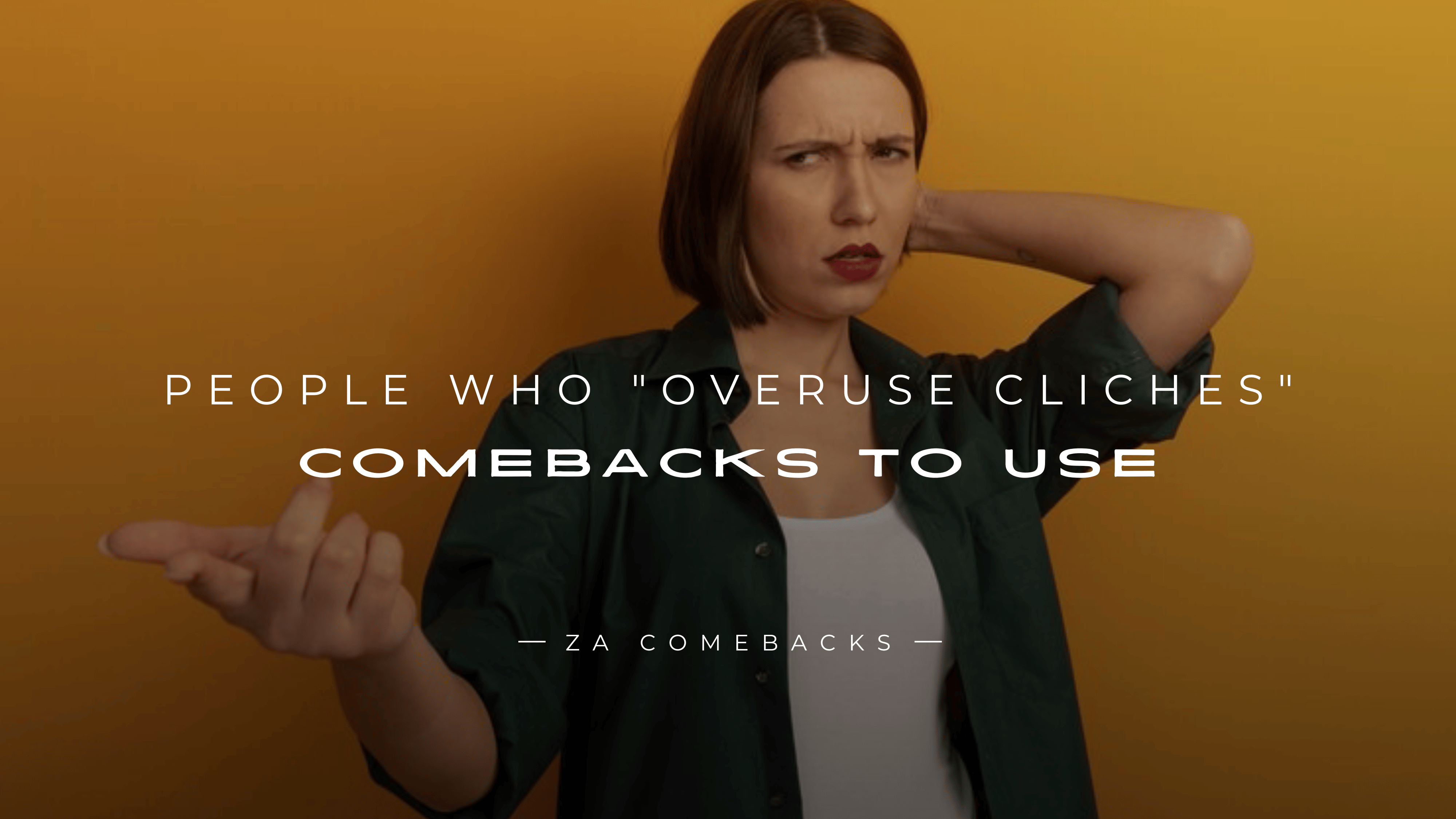You know the type—the person who seems to have a set list of phrases they use in every conversation. “At the end of the day,” “It is what it is,” “Let’s be real,” and the classic “Think outside the box.” We’ve all encountered people who overuse clichés, and while these phrases can be comforting, they often make conversations dull and uninspired. But what can you do when someone you know constantly relies on clichés?
In this article, we’ll dive into the world of clichés, why people use them, and how to handle conversations with those who “overuse clichés.” Let’s explore some comebacks and ways to spark more meaningful dialogue without the overreliance on the exact tired phrases.

150+ Comebacks for People Who “Overuse Cliches”
Sarcastic Responses
- Oh, great, another gem. Should I be writing this down for my following motivational speech?
- How profound! Did you just come up with that, or did you read it off a poster in a dentist’s office?
- I’m so glad you’ve decided to bless me with your insight. I’ll be sure to carry that with me forever.
- Let me get my life-changing notebook—I need to take notes on this one!
- If I hear that again, I might lose my mind.
- Wow, you went out on a limb with that one. Do you have any more profound revelations?
- Is that from the best of clichés collection, or is it an original thought?
- That’s the third time today I’ve heard that. Is it getting old for you, too?
- That wasn’t the most predictable thing I’ve heard all day.
- So you’re saying it’s always darkest before the dawn? Did you get that from a 90s movie?
Play on Words
- You’re barking up the wrong tree with that one.
- That was a close call—you almost sounded like you had a unique thought!
- Is this your silver lining after many gray clouds?
- You’re spinning your wheels, but no one’s going anywhere.
- Are you getting cold feet or just frosting the tips of that idea?
- I love how you hit the nail on the head… wish it wasn’t such an overused hammer.
- Careful, you might slip on that banana peel of a cliché.
- It seems like you’re just scratching the surface without diving more deeply.
- It sounds like you’re beating a dead horse with that one!
- Is this another case of burning the candle at both ends or just a well-worn phrase?
Challenging Their Thinking
- Do you ever come up with an idea that doesn’t sound like it’s been recycled a hundred times?
- What would you say if you could put down the cliché handbook?
- Can you give me an honest, personal example that doesn’t sound like it came from a greeting card?
- Do you think there’s a better way to approach this, or will we keep quoting clichés?
- How about we try something new—or is that too radical for your taste?
- I’d love to hear your thoughts without the cookie-cutter phrases thrown in.
- What would you say if you didn’t have a pre-packaged answer ready?
- Do you believe that, or is it just another thing you heard someone else say?
- Are you sure you’re thinking outside the box or just using the box as a crutch?
- Can you picture a world where we don’t rely on worn-out expressions to explain everything?
Playful Mockery
- You read that off a motivational poster last week, didn’t you?
- You have a whole collection of inspirational quotes, huh?
- I can practically hear the background music swelling every time you say that.
- Did you get that from the dictionary of clichés, or was it more of a ‘gut feeling’?
- That’s the kind of line you hear right before the inspirational montage in a movie.
- You’re the walking embodiment of a self-help book.
- Next time, try speaking in real-life scenarios instead of chapter titles.
- I think you’ve just won cliché bingo with that one.
- That sounds like it was pulled straight from the Hallmark Channel script.
- Does your mantra always keep originality from getting in the way of a good phrase?
Dismissive Comebacks
- Yep, that sounds just as meaningless as it did last time.
- If I had a dime for every time, someone said I’d be living my best life by now.
- Oh, you’ve said that before, haven’t you? Try something new next time.
- Wow, how original… said no one ever.
- Some of us are looking for more than just the same old line.
- That’s cute… but I’ve heard it a million times before.
- Keep recycling those lines. They’re certainly not making any impact.
- We all know what happens when you assume, but I’ll let you finish anyway.
- That’s nice and predictable—any other pearls of wisdom?
- Just like last time, it’s all talk and no substance.
Subtle Dig
- You must think that’s brilliant, but it’s a little tiring now.
- I love hearing those recycled thoughts again!
- You really should try using something other than tried and true phrases.
- Oh, how cute, you’re stuck in classic cliché mode again.
- Does every situation need to be fixed with a cliché?
- Do you think that’ll work? It sounds more like you copied it off a fortune cookie.
- So, you’re telling me that life is like a box of chocolates… again?
- That was an interesting attempt at being profound, though.
- At least you didn’t repeat the same old motto—wait, never mind.
- Sure, that’s precisely what we need—another tired cliché.
Humorous Rebuttals
- Well, that was so deep… like a puddle.
- Wow, that’s an award-winning cliché if I’ve ever heard one!
- That was so profound I will need a moment to recover from it.
- You sure know how to keep things interesting by making them so dull.
- You’ve covered all the inspirational phrases, but what about original thoughts?
- That’s right, next up we’ll discuss life’s greatest mysteries like ‘what’s for lunch’.
- That was almost as deep as a puddle in the desert.
- You sound like a talking fortune cookie right now.
- I just felt my brain cells take a vacation when you said that.
- You should start charging for those life-changing quotes you keep spitting out!
Logical Counter-Arguments
- Not everything is meant to happen for a reason; sometimes things just happen.
- I don’t think it’s always darkest before the dawn; sometimes, the night just sucks.
- Not every problem is a lesson in disguise. Some issues could be more annoying.
- Sure, what goes around comes around, but some things just fall through the cracks.
- Saying ‘it’s all part of the journey’ doesn’t change that some parts are unpleasant.
- Not everything is meant to be—some things just are what they are.
- Life’s a rollercoaster, but I’d prefer a smooth ride for once.
- We keep saying time heals all wounds, but sometimes it stays sore.
- Sometimes, failure is just failure, not a lesson to be learned.
- Sure, every cloud has a silver lining, but some clouds are really dark.
Pop Culture References
- That’s almost as original as a rom-com plot twist!
- I think I’m living in a John Hughes movie with that line.
- You’re like a walking meme with that one.
- That’s straight out of a Hollywood script—too bad it’s been overdone.
- Did you get that from The Office, or was it Friends?
- I’m in a reality show where all you do is repeat one-liners.
- Is that your superhero origin story, or did you pick it up from Netflix?
- So you’re telling me life’s a game, like in The Hunger Games?
- That’s right up there with a Star Wars quote—very original.
- If this were a movie, that line would be in the trailer.
Exaggerated Responses
- That was so deep I would a guard to rescue me from all these waves of wisdom.
- Wow, you should get that printed on a billboard; it’s life-changing.
- My entire worldview just shifted after hearing that.
- If I had a nickel for every time I’ve heard that, I’d be the wealthiest person on Earth right now!
- You’ve just unlocked the secret to life with that one sentence!
- That was so profound; I’m sure people will be studying your words in history books one day.
- I’m pretty sure that phrase just revolutionized my existence.
- That was so good; I will call Oprah for a special interview.
- I’m speechless… like, I’m considering retiring after hearing that.
- That was enlightening; I’ll probably start a religion based on that sentence.
Reflection of Cliché Back at Them
- You know what they say: You can’t have your cake and eat it too, but at least you’re feeding me clichés.
- Ah yes, it’s always darkest before the dawn—unless you’re just stuck in a perpetual cycle of clichés.
- You’re right; what goes around comes around—but I’m starting to feel like I’ve heard that one a thousand times.
- Actions speak louder than words, but it seems all your actions quote others.
- You’re preaching patience, but I’m already losing mine with these well-worn phrases.
- They say everything happens for a reason, but I’ll start questioning that every time you say something like this.
- We get it; life’s a journey, but we’re on a one-way trip to Cliché-ville.
- Sometimes, the best things in life are free, especially when it’s an overused line.
- Ah, yes, the grass is always greener on the other side… unless that side is full of clichés, too.
- What doesn’t kill you makes you stronger, but I think these clichés might just wear me down.
A Playful Take on Common Cliché Phrases
- Sure, the early bird catches the worm, but I’m still waiting for that worm to show up.
- Yes, life is like a box of chocolates—and I always end up with the one that’s a little too nutty.
- I get it; time flies when you’re having fun—but I think my watch ran out of batteries.
- You can lead a horse to water, but that horse will probably stand there like I am with these clichés.
- I love the idea of the road less traveled, but I’m starting to think it’s all just a detour back to clichés.
- If the shoe fits, wear it… but that she’s a little tight with all these overused phrases.
- When one door closes, another opens—unless you’re in the cliché hallway with only one exit.
- Sure, actions speak louder than words, but right now, I think I’m hearing a lot of echoes from the past.
- I get it; every cloud has a silver lining… but is this cloud full of recycled thoughts?
- Rome wasn’t built in a day—and neither were these tired clichés.
Hyperbolic Praise
- That idea is so revolutionary it may change the course of history!
- You’re not just quoting clichés; you’re setting the world on fire with your wisdom!
- That was so groundbreaking it probably should’ve come with a warning label.
- I’m pretty sure that idea just made you the world’s most influential thought leader.
- This is going to be the new mantra for generations to come!
- I’m in awe of how much you’ve redefined reality with that one sentence!
- That was so profound; I feel like I’ve been given the key to the universe.
- Wow, that’s the kind of insight that could make you the next Dalai Lama.
- That’s not just a cliché; that’s the foundation of modern philosophy!
- If I had a medal for hearing the most impactful sentence, it would go to you.
Reverse Psychology
- Would saying something someone else says get us somewhere? Go on, keep it up.
- Honestly, keep using those tried-and-true lines. It’s not like anyone is looking for fresh ideas anyway.
- By all means, continue with the cliché parade. I’m sure we’ll all be so impressed with your originality.
- Sure, that phrase is a classic. You can keep repeating it, but I’ll just keep nodding.
- Keep saying what everyone else has said a thousand times—it’s working for you.
- Wow, there’s nothing new here—please, don’t stop. I’m sure everyone’s waiting for the next one.
- Oh, I’m sure everyone loves hearing those same lines again. Keep hitting the nail on the head!
- Why stop now? You’ve already mastered the art of saying nothing—keep going!
- Please continue repeating those phrases. After all, who needs originality when you’ve got familiar comfort?
- It’s impressive how you manage to sound profound while saying nothing—keep at it!
Overly Philosophical Comebacks
- In a world where every cloud has a silver lining, perhaps these clichés are our way of masking the truth.
- Isn’t it fascinating how we find meaning in repetition as if each cliché unlocks a piece of the human soul?
- If we accept that life is a journey, shouldn’t we strive to make it more than just a repetitive path of overused phrases?
- Perhaps the real lesson lies in embracing the silence between words rather than filling it with clichés.
- In the grand tapestry of existence, aren’t we all just recycling the same old wisdom passed down through generations?
- To truly understand that what goes around comes around, we must first realize that some things never change—and that can be a blessing or a curse.
- When you say that actions speak louder than words, are you not simply trying to capture the essence of existence?
- What if the real wisdom lies not in the cliché, but in questioning why we repeat these exact words repeatedly?
- They say everything happens for a reason, but maybe the reason is simply that we’ve grown too comfortable with the predictable.
- If we are all staring at the stars, can we not also recognize that the same old constellations reflect our desire for meaning in the unknown?
Understanding the Impact of Overused Clichés
- How Clichés Lose Their Meaning
Clichés begin as clever or insightful expressions that serve a purpose in communication, but as they are repeated, they lose their impact. What was once a fresh perspective turns into a lazy shortcut. When someone continually uses these phrases, the listener can become disengaged, not because of the message but because of how it’s delivered.
- The Negative Effect on Communication
Relying on clichés can make conversations feel superficial. It’s like hearing the same song on repeat—eventually, you tune out. This can hinder your ability to connect with others on a deeper level. You might agree but not truly understand what’s being said, leaving room for misinterpretation.
- The Role of Originality in Meaningful Conversation
Conversely, when we speak with originality, we engage others more meaningfully. Original thoughts show creativity and critical thinking, fostering a stronger connection between people. Creativity in speech allows us to express complex ideas in fresh and exciting ways.
Types of Overused Clichés
People often fall back on a whole arsenal of clichés without thinking. Let’s look at a few of the most common ones.
- The “At the End of the Day” Cliché
It’s the perfect filler phrase when someone is wrapping up a thought, but it rarely adds anything new. It’s essentially a signal that the conversation is winding down—but when overused, it’s another way to avoid offering a clear conclusion.
- The “Think Outside the Box” Cliché
Everyone’s heard this one, usually in a work environment where someone’s trying to encourage creativity. However, after hearing it many times, the phrase loses its appeal. The problem isn’t the message but the repetitive nature of the advice itself.
- The “It Is What It Is” Cliché
This phrase often comes up when there’s a sense of resignation, like when someone is stuck with a situation they can’t change. It’s used to end the conversation prematurely, but it leaves a lot of unresolved feelings behind. What’s the next step after that? “It is what it is” doesn’t help move things forward.
- The “All in All” Cliché
Commonly used in conclusions or summaries, “all in all” doesn’t say anything substantial. It’s a vague way to tie everything up without offering new insights or a unique perspective.
- The “Let’s Be Real” Cliché
“Let’s be real” is often used to make a conversation seem more honest or direct. But it can come across as pretentious when used too often. The phrase suggests that everything else before wasn’t “real,” which can be alienating.
Why People Rely on Clichés
There’s no mystery as to why people lean on clichés. Let’s break down some of the reasons why:
- Comfort and Habit
Many people use clichés because they’ve become second nature. It’s an easy way to express a thought without putting much effort into crafting something unique. Like wearing your favorite sweater, clichés are just… comfortable.
- Laziness in Conversation
Sometimes, it’s easier to rely on a well-worn phrase than to engage in the mental gymnastics required to express an idea freshly. It’s not always intentional, but laziness can contribute to overused conversation clichés.
- Avoiding Deep Thinking
Clichés also allow people to avoid difficult conversations or deep thinking. It’s easy to throw out a quick saying instead of diving into a more complex or uncomfortable discussion. It’s a way to bypass the nuances of a situation.
- Attempting to Sound Wise or Professional
Some people overuse clichés because it makes them sound more authoritative, wise, or professional. It’s an easy way to appear like you have insights, but it can come across as disingenuous.
How to Handle People Who Overuse Clichés
If you find yourself in a conversation with someone who overuses clichés, there are several approaches you can take to handle the situation gracefully.
- Gently Calling Out the Cliché
Sometimes, all it takes is pointing out the use of a cliché. You don’t have to be confrontational, but kindly saying, “You know, I’ve heard that a lot lately,” can help the person realize they’ve fallen into a habitual pattern.
- Offering More Meaningful Alternatives
When someone uses a cliché, try offering a more specific, creative alternative. Instead of “It is what it is,” say, “We could try to find a solution,” or “That’s unfortunate, but we can still make progress.” This keeps the conversation moving forward in a more meaningful direction.
- Asking Follow-up Questions to Clarify Intent
Sometimes, people use clichés as a way to avoid elaborating. You encourage them to think deeper about their point by asking follow-up questions. For example, “What exactly do you mean by that?” can open up the conversation and make it more substantive.
- Using Humor to Deflect the Cliché
A lighthearted approach can also help deflect clichés without making the conversation awkward. A playful comment like, “I feel like I’ve heard that in every motivational poster,” can bring some fun to the situation.
- Role-playing a Conversation to Showcase Creativity
In a casual setting, try role-playing different scenarios that require creative thinking. This allows the person to break free from cliché habits and develop new ways to express ideas.
Examples of Effective Comebacks for People Who Overuse Clichés
Let’s explore some comebacks you can use when people pull out their cliché cards.
- When Someone Says, “At the End of the Day…”
Comeback: “But what happens before the end of the day? Let’s talk about that.”
- When Someone Says, “Think Outside the Box…”
Comeback: “Sure, but why not redefine the box while we’re at it?”
- When Someone Says, “It Is What It Is…”
Comeback: “It is what it is, but what are we going to do about it?”
- When Someone Says, “All in All…”
Comeback: “That’s an interesting way to wrap things up. What’s the most important takeaway for you?”
- When Someone Says, “Let’s Be Real…”
Comeback: “I thought we already were real. What’s going on underneath that phrase?”
Tips for Encouraging More Creative Conversations
- The Power of Curiosity in Conversation
One of the best ways to avoid clichés is to stay curious. Ask open-ended questions and dive deeper into the topics that interest you. Curiosity leads to more exciting and unique exchanges.
- How to Encourage Authentic Dialogue
Encourage people to speak from the heart. Set the tone by being open, honest, and vulnerable. This creates a space where clichés don’t need to be relied upon.
- Techniques to Challenge Overused Phrases
You can challenge clichés by offering alternatives or simply asking for clarification. “What do you mean by that?” forces the person to think outside their usual patterns.
- The Art of Thoughtful Silence
Sometimes, it’s not about speaking—it’s about listening. Letting silence pass can create room for more profound thoughts and original responses.
Conclusion
In conclusion, while clichés are often overused in conversations, having a sharp comeback can help you navigate these situations with humor and wit. The 150+ comebacks we’ve shared can serve as your go-to responses when dealing with someone who relies too heavily on these tired phrases. Whether you’re looking to add some humor or want to shut down a cliché enthusiast, these comebacks will ensure you’re never caught off guard. And if you’re dealing with another frustrating situation, like when someone steals your idea, be sure to check out our guide on When Someone “Steals Your Idea”: 150+ Comebacks to Use Here for more witty responses!
FAQs
Q. Why do people love clichés?
People love clichés because they’re familiar, easy to use, and often serve as conversation fillers. However, overuse can make them lose their impact.
Q. How do I stop using clichés in my speech?
To stop using clichés, focus on expressing your thoughts in specific and unique terms. Take a moment to think before speaking, and choose your words with intention.
Q. Are clichés always bad?
Only sometimes! Clichés can be effective in specific contexts, but overusing them can make conversations feel less genuine.
Q. Can clichés be used effectively in certain situations?
Yes, clichés can be used for emphasis or humor, but they should be employed sparingly to avoid sounding repetitive.
Q. How can I encourage more creative conversations with my friends or colleagues?
Encourage openness, ask more profound questions, and create a space where original thoughts can flourish. Keep the dialogue engaging by challenging overused phrases with creativity.









